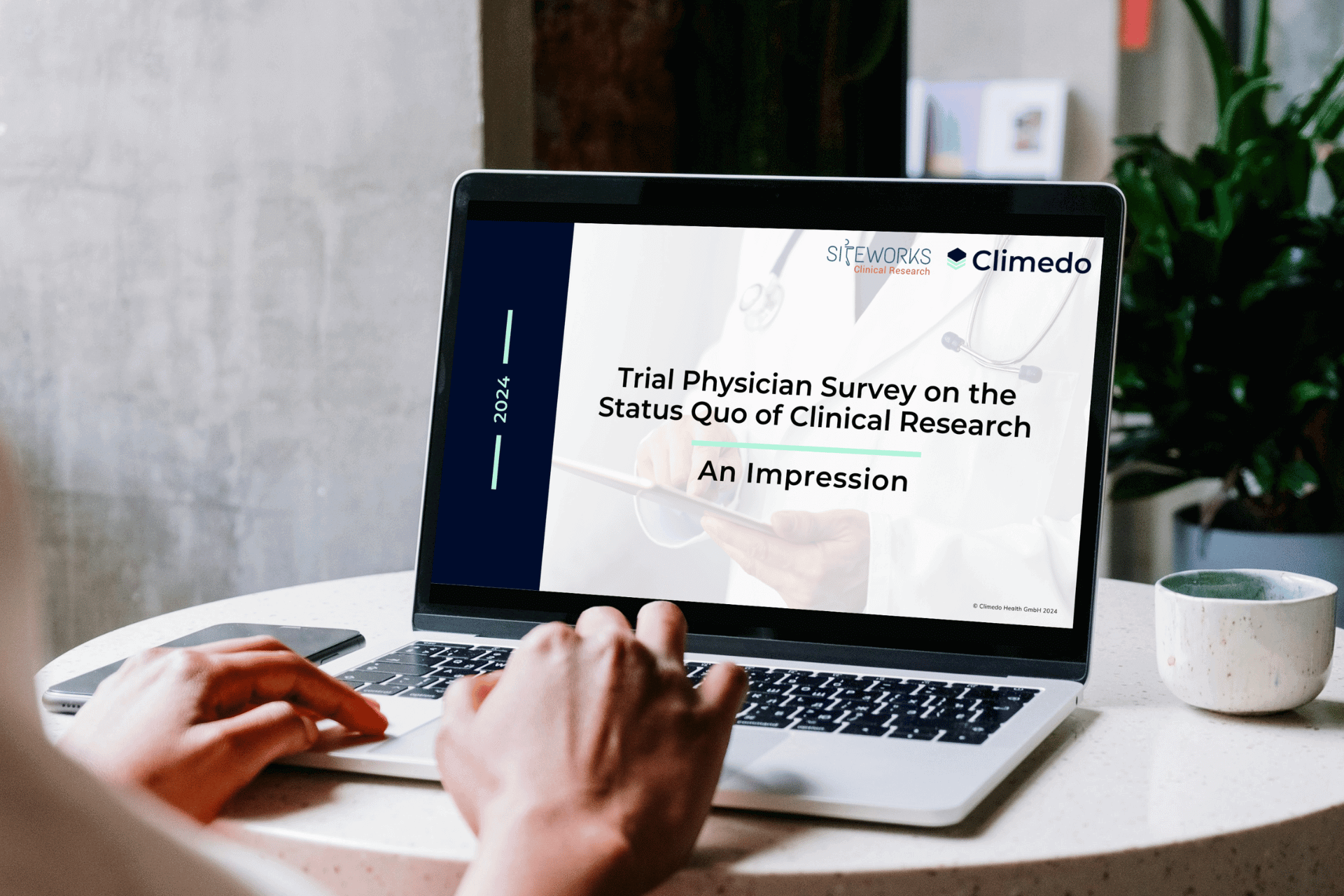Trial Physician Survey: Status Quo in Clinical Research

DATE
March 11, 2024
AUTHOR
Benjamin Sauer | VP Engineering
Introduction:
In the fall of 2023, we collaborated with Siteworks Clinical Research to conduct a clinical trial physician survey aiming to understand trial physicians’ perspectives on clinical trials and capture the current state of clinical research. This is increasingly important as investigator recruitment and retention significantly impact clinical trial sponsors. We surveyed 66 study physicians from various therapeutic specialties, with most based in Europe. The questionnaire included 19 questions covering different topics, such as:
1. Status Quo: Gathering essential data on past study involvement and the factors that drive physicians to participate as investigators.
2. Motivation and challenges: Recognizing challenges to trial participation, understanding the necessary commitments and physicians’ expectations from sponsors and CROs.
3. Digital technologies in trials: Investigating the utilization of various tools in trials, evaluating physicians’ views on their capabilities, and identifying technologies they wish to incorporate into their routines.
Trial Physician Survey: Insights into the results
Demographics
The survey included 66 study physicians from various specialties, with the majority from internal medicine, followed by neurology and oncology/hematology. Nearly 80% of respondents had prior experience with non-interventional studies (NIS). In terms of study phases, participation was distributed as follows: 23% in phase I studies, 49% in phase II, 68% in phase III and 52% in phase IV. About 22% of participants had been involved in two trials in the last 24 months, while 78% had participated in more than three trials. On average, study physicians cared for around 70 patients over a 24-month period.
Trial Physician Survey: Status Quo in Clinical Research
Our survey among trial physicians provides interesting insights into various areas of clinical research, including:
- Motivation and challenges to study participation for investigators
- Expectations of study sponsors and CROs
- Respondents’ openness towards digital technologies in studies

Status Quo and Challenges
The trial physician survey findings indicate that compensation expectations vary based on the type of study. On average, compensation ranged from €200 per hour for phase 1 trials to €123 for phase 4 trials.
Regarding the motivating factors for participating in studies, respondents primarily indicated the advancement of science (80%), early access to new treatments (55%) and building scientific reputation (55%). While 80% of participants expressed a desire for appropriate compensation from sponsors and contract research organizations (CROs), securing third-party funding was considered less important, at just under 40%. Additionally, respondents mentioned the opportunity to assist patients with new therapies among other motivating factors. The primary obstacle to study participation was the significant time commitment required (71%). Other obstacles included challenges with patient recruitment and retention (over 50%), staff shortages (50%) and inadequate digital equipment (30%). Bureaucratic and administrative burdens were also noted as contributing factors.
Among the respondents, 52% perceived the documentation effort to be higher than expected, while nearly half (46%) found it to be in line with their expectations. Only a small percentage (2%) felt that the effort required was lower than anticipated. Regarding improvements for better study implementation, the majority of respondents (70%) expressed a desire for appropriate compensation. Additionally, there was a clear indication (over 60%) for the need of enhanced tools, particularly digital solutions, viewed as highly efficient. Realistic recruitment timelines, more preparation and follow-up time, and improved communication from sponsors were also considered important by approximately 40% of respondents. Additional support with publications (around 40%) and opportunities for networking with other physicians (one third) were mentioned as well. Other suggestions included simpler solutions, backup options, and standardized platforms.
Digital technologies in clinical trials
The trial physician survey findings reveal an encouraging trend regarding the integration of digital technologies in clinical trials, with approximately 85% of respondents already incorporating at least one digital tool in this domain. Among the most frequently mentioned technologies were eCRF (electronic Case Report Form), ePRO (electronic Patient-Reported Outcomes) and EHR (Electronic Health Record). Additionally, wearables, dashboards and telemedicine were utilized by approximately a quarter of all participants. Notably, eCRF, ePRO and EHR were perceived to have the highest potential among the surveyed tools. Although wearables and dashboards were used by a quarter of respondents, they were less likely to be rated as having “high” potential.
It’s notable that over 80% of respondents were interested in comparing therapeutic results with other physicians, seeing it as a way to better understand their own treatments. Similarly, nearly 90% of doctors found the idea of tracking relevant parameters per patient/visit to create a progression curve appealing, as it would provide a clear overview of the data. Additionally, a significant majority (94%) expressed interest in real-time data processing and presentation during ongoing studies, which could make studies more attractive to physicians. About a third of respondents were open to digital monitoring, particularly due to its flexibility and time-saving potential. However, around two-thirds still preferred face-to-face meetings as part of on-site appointments, as personal contact remained important to them.
Climedo Connect: Unlocking RWE’s Potential for HCP Engagement
In one of our past webinars, Dr. Helene Vioix (Director Global Value Development Oncology, Merck) presented best practices that illustrate how the influence of real-world data can be optimally utilized to engage healthcare professionals (HCPs) and key thought leaders (KTLs).

Final remarks
In the concluding comments, it was emphasized that the free use of eCRF/ePROMs could save considerable work resources. The importance of providing comprehensive training on technical equipment onsite was also underscored as a crucial step toward streamlining workflows. However, despite these positive strides, integrating clinical trials into everyday clinical practice remains challenging. Persistent issues such as inconsistencies in payment processes, bureaucratic hurdles, and staffing and time constraints make it difficult for study physicians to seamlessly incorporate trial implementation into their daily routines. Therefore, there is an ongoing need for enhancements and support to facilitate the adoption of digital solutions and ensure effective integration into clinical practice.
Conclusion
Thank you to all participants for your time and effort, without you this survey would not have been possible. A special thank you goes to Siteworks for their valuable support throughout the process. You can access the complete results free of charge here.
We plan to conduct another survey on the status quo in clinical research in the future. We will expand the group of respondents to include all study participants. We look forward to gaining even more valuable insights into the industry.
If you would like to learn more about Climedo’s interactive dashboards or would like tips on how to better engage Key Opinion Leaders (KOLs) in studies, don’t hesitate to schedule a free demo. We are always at your disposal.






